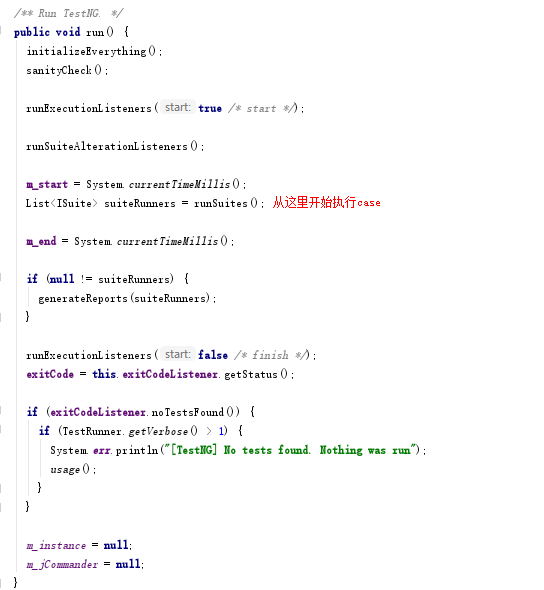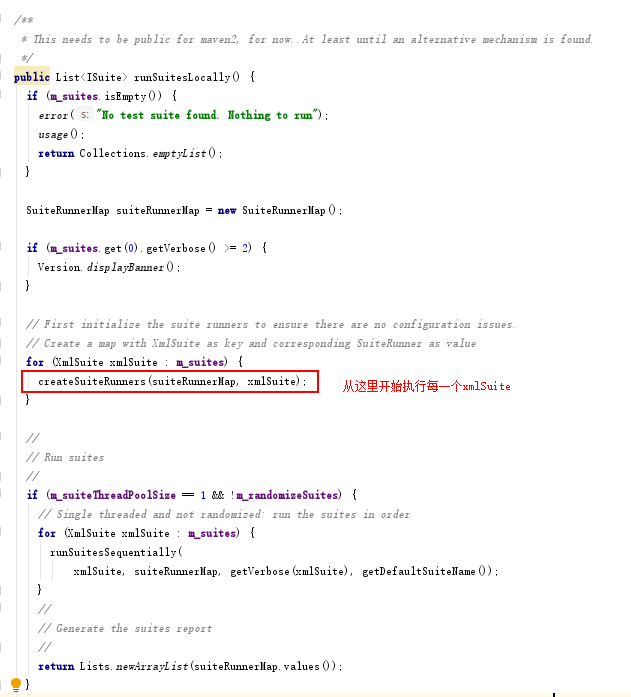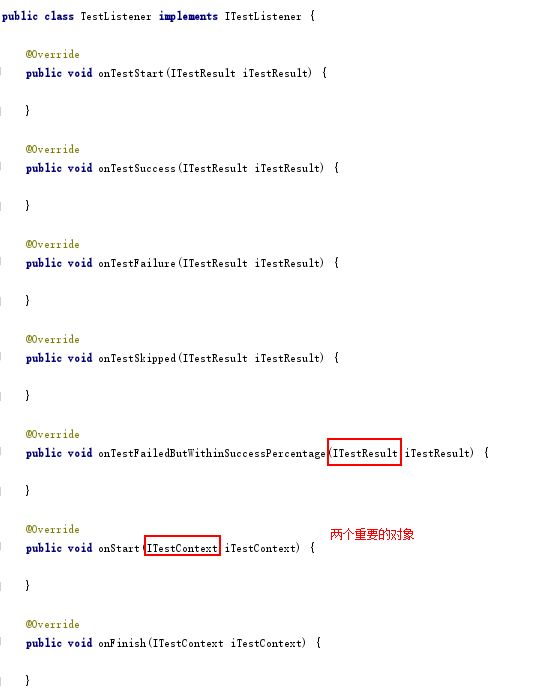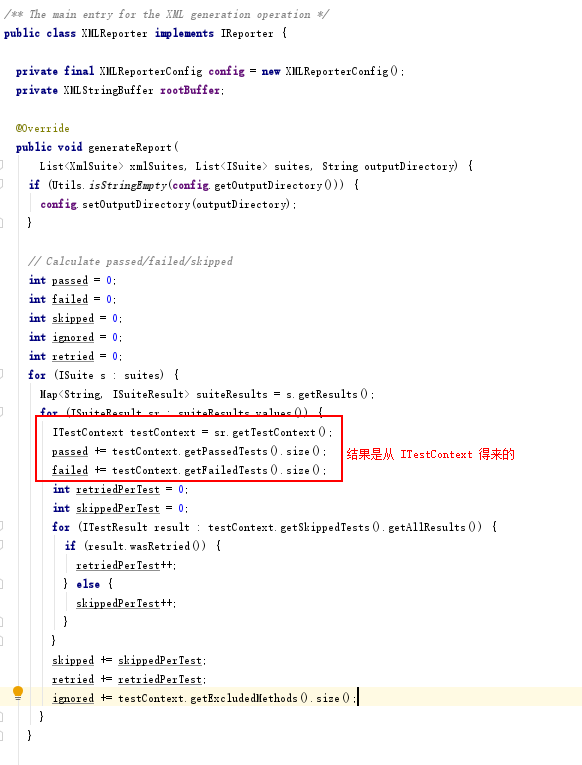自动化调优——TestNG失败用力批量重试

阅读本文大约需要10分钟
背景
执行自动化测试用例时,经常会因为网络、环境等不确定因素导致执行结果不稳定。
为解决该问题,TestNG提供了失败用例立即重试的机制,此处的立即,指的是1个用例失败后,用户可以自定义操作之后决定是否重新执行该用例;执行完指定次数的重试或者在指定次数内成功之后,再执行下1个用例。上述描述只需要编写自定义的Retry类implements IRetryAnalyzer即可快速实现。已经有很多成功的案例,直接网上搜索即可快速找到教程,此处不再赘述。
然而,ci流水线上,大部分情况下,如果1个用例在某一时刻(秒级别)是失败的,再次重试80%以上也会是失败的。面对这种情况,我们一般都是在本地重试这些失败的case,往往又是可以成功通过的。那么,我们是否可以在ci流水上模拟这种操作, 等所有的用例执行完毕之后,重置环境,再统一重试执行失败的用例 呢?
由此需要先看看TestNG的源码的执行原理。
源码解读
GitHub下载 TestNG最新源码
执行入口
TestNG.run()方法


由以上代码可知, 只要将所有失败的case设置到一个新的xmlSuite上,调用TestNG.run()方法即可重试失败的case。
失败结果重置
众所周知,自定义listener implements ITestListener可以监听测试结果,onFinish方法中,能够获取到所有用例的执行结果。只要重写这个方法,就能够将失败后重试成功的用例结果重置。

报告修改
原生的报告是由XMLReporter.java生成的,从源码中不难看出,xml报告是基于ITestContext生成的。而ITestContext这个熟悉的对象,不正是上一步监听器中刚刚出现过吗?将源码中的XMLReporter.java复制出来,稍作修改,即可将覆盖原生的报告。也可以使用开源框架,或者自己编写代码生成自定义格式的报告。

批量重试关键代码
重试配置类
TestRetryConfig.java,主要用来储存重试的一些配置及过程数据,如当前重试次数、重试最大次数、每次执行的ITestContext等。
public class TestRetryConfig {
public static final String TEST_PACKAGE_PATH = "com.xxx.xxx.testcases.";
public static final String RETRY_SUIT_NAME = "TestNG Retry Test";
public static int retryCount = 0;
public static int retryMax = 0;
public static List<ITestContext> finishTestContextList = new ArrayList();
public static ITestContext testContext = null;
public static void setRetryMax(int max) {
retryMax = max;
}
}
执行指定用例类
TestNgController.java,根据指定的Method,设置suite,并使用TestNG.run()方法执行用例。
public class TestNgController {
/***
* 需要重试的testNGMethod
*/
List<ITestNGMethod> testNGMethodList;
/***
* 按类名将ITestNGMethod分类
*/
Map<String, List<String>> failClassMethodMap;
public TestNgController(Collection<ITestNGMethod> testNGMethodSet) {
this.testNGMethodList = new ArrayList<>(testNGMethodSet);
}
private void getFialMap() {
if (this.testNGMethodList != null && this.testNGMethodList.size() > 0) {
failClassMethodMap = new HashMap<>();
for (ITestNGMethod iTestNGMethod : testNGMethodList) {
String className = iTestNGMethod.getTestClass().getName();
if (failClassMethodMap.get(className) != null) {
failClassMethodMap.get(className).add(iTestNGMethod.getMethodName());
} else {
List<String> methodList = new ArrayList<>();
methodList.add(iTestNGMethod.getMethodName());
failClassMethodMap.put(className, methodList);
}
}
}
}
/**
* TestNG测试程序化调用
*/
public boolean executeTests() {
//获取失败用例map
getFialMap();
//没有失败的用例
if (failClassMethodMap == null || failClassMethodMap.keySet().size() == 0) {
return false;
}
//构建testng.xml内存对象
try {
List<XmlSuite> suites = new ArrayList<XmlSuite>();
XmlSuite suite = new XmlSuite();
suite.setName(TestRetryConfig.RETRY_SUIT_NAME + TestRetryConfig.retryCount);
List<String> suiteListeners = new ArrayList<String>();
suiteListeners.add(TestListener.class.getName());
suite.setListeners(suiteListeners);
suites.add(suite);
XmlTest test = new XmlTest(suite);
test.setName(TestRetryConfig.RETRY_SUIT_NAME + TestRetryConfig.retryCount);
List<XmlClass> classes = new ArrayList<XmlClass>();
Set<String> failClassSet = failClassMethodMap.keySet();
for (String className : failClassSet) {
List<String> methodNameList = failClassMethodMap.get(className);
List<XmlInclude> includedMethodList = new ArrayList<>();
for (String methodName : methodNameList) {
includedMethodList.add(new XmlInclude(methodName));
}
XmlClass testClass = new XmlClass(className);
testClass.setIncludedMethods(includedMethodList);
classes.add(testClass);
}
test.setXmlClasses(classes);
LogUtils.log(String.format("第%s次执行批量重试测试用例开始!!!!!!!!! ",TestRetryConfig.retryCount));
//设置TestNG,并开始执行用例
TestNG testNG = new TestNG();
testNG.setXmlSuites(suites);
testNG.run();
return true;
} catch (Exception e) {
LogUtils.log("批量重试测试用例执行失败: " + e.getMessage());
e.printStackTrace();
}
return false;
}
public static void main(String[] args) {
TestNgController testNgController = new TestNgController(Collections.EMPTY_LIST);
testNgController.executeTests();
}
}
结果监听器
TestListener.java,主要记录每次执行完毕的结果,以及遇到失败时调用TestNgController进行执行失败case。
public class TestListener implements ITestListener {
@Override
public void onTestStart(ITestResult iTestResult) {
}
@Override
public void onTestSuccess(ITestResult iTestResult) {
}
@Override
public void onTestFailure(ITestResult iTestResult) {
}
@Override
public void onTestSkipped(ITestResult iTestResult) {
}
@Override
public void onTestFailedButWithinSuccessPercentage(ITestResult iTestResult) {
}
@Override
public void onStart(ITestContext iTestContext) {
}
@Override
public void onFinish(ITestContext iTestContext) {
TestRetryConfig.finishTestContextList.add(iTestContext);
//记录首次执行的测试集
if (TestRetryConfig.testContext == null) {
TestRetryConfig.testContext = iTestContext;
}
//已重试次数<最大重试次数,继续执行失败case
if (TestRetryConfig.retryCount < TestRetryConfig.retryMax) {
TestRetryConfig.retryCount++;
TestNgController testNgController = new TestNgController(iTestContext.getFailedTests().getAllMethods());
//有失败case,继续执行,无需处理结果
if (testNgController.executeTests()) {
return;
}
}
//若无失败case,没有继续执行,则需要继续处理结果
//指向首次执行的测试集
iTestContext = TestRetryConfig.testContext;
List<ITestResult> testsToBeRemoved = new ArrayList<>();
Set<Integer> passedTestIds = new HashSet<>();
//筛选出多次重试之后所有成功的用例
for (ITestContext testContext : TestRetryConfig.finishTestContextList) {
for (ITestResult passedTest : testContext.getPassedTests().getAllResults()) {
// LogUtils.log("PassedTests = " + passedTest.getMethod().getTestClass().getName() + "." + passedTest.getMethod().getMethodName());
passedTestIds.add(getId(passedTest));
}
}
//筛选出多次重试之后所有失败的用例
Set<Integer> failedTestIds = new HashSet<Integer>();
for (ITestResult failedTest : iTestContext.getFailedTests().getAllResults()) {
// LogUtils.log("failedTest = " + failedTest.getMethod().getTestClass().getName() + "." + failedTest.getMethod().getMethodName());
int failedTestId = getId(failedTest);
if (failedTestIds.contains(failedTestId) || passedTestIds.contains(failedTestId)) {
testsToBeRemoved.add(failedTest);
} else {
failedTestIds.add(failedTestId);
}
}
//将重试之后成功的用例,从失败结果集中删除,并添加到成功的结果集
for (Iterator<ITestResult> iterator = iTestContext.getFailedTests().getAllResults().iterator(); iterator
.hasNext(); ) {
ITestResult testResult = iterator.next();
if (testsToBeRemoved.contains(testResult)) {
LogUtils.log("Change failed test to passed: " + testResult.getMethod().getTestClass().getName() + "." + testResult.getMethod().getMethodName());
iterator.remove();
iTestContext.getPassedTests().addResult(testResult, testResult.getMethod());
}
}
}
private int getId(ITestResult result) {
int id = result.getTestClass().getName().hashCode();
id = id + result.getMethod().getMethodName().hashCode();
id = id + (result.getParameters() != null ? Arrays.hashCode(result.getParameters()) : 0);
return id;
}
xml报告监听器
XMLReporter.java,从源码中复制出来,稍作修改。
/**
* The main entry for the XML generation operation
*/
public class XMLReporter implements IReporter {
public static final String FILE_NAME = "testng-results.xml";
private final XMLReporterConfig config = new XMLReporterConfig();
private XMLStringBuffer rootBuffer;
@Override
public void generateReport(List<XmlSuite> xmlSuites, List<ISuite> suites, String outputDirectory) {
ITestContext testContext = TestRetryConfig.testContext;
if (Utils.isStringEmpty(config.getOutputDirectory())) {
config.setOutputDirectory(outputDirectory);
}
// Calculate passed/failed/skipped
int passed = testContext.getPassedTests().size();
int failed = testContext.getFailedTests().size();
int skipped = testContext.getSkippedTests().size();
int ignored = 0;
int retried = 0;
rootBuffer = new XMLStringBuffer();
Properties p = new Properties();
p.put("passed", passed);
p.put("failed", failed);
p.put("skipped", skipped);
if (retried > 0) {
p.put("retried", retried);
}
p.put("ignored", ignored);
p.put("total", passed + failed + skipped + ignored + retried);
rootBuffer.push(XMLReporterConfig.TAG_TESTNG_RESULTS, p);
writeReporterOutput(rootBuffer);
for (ISuite suite : suites) {
if (suite.getName().contains(TestRetryConfig.RETRY_SUIT_NAME)) {
continue;
}
writeSuite(suite);
}
rootBuffer.pop();
Utils.writeUtf8File(config.getOutputDirectory(), fileName(), rootBuffer, null /* no prefix */);
}
private static String fileName() {
return FILE_NAME;
}
private void writeReporterOutput(XMLStringBuffer xmlBuffer) {
// TODO: Cosmin - maybe a <line> element isn't indicated for each line
xmlBuffer.push(XMLReporterConfig.TAG_REPORTER_OUTPUT);
List<String> output = Reporter.getOutput();
for (String line : output) {
if (line != null) {
xmlBuffer.push(XMLReporterConfig.TAG_LINE);
xmlBuffer.addCDATA(line);
xmlBuffer.pop();
}
}
xmlBuffer.pop();
}
private void writeSuite(ISuite suite) {
switch (config.getFileFragmentationLevel()) {
case XMLReporterConfig.FF_LEVEL_NONE:
writeSuiteToBuffer(rootBuffer, suite);
break;
case XMLReporterConfig.FF_LEVEL_SUITE:
case XMLReporterConfig.FF_LEVEL_SUITE_RESULT:
File suiteFile = referenceSuite(rootBuffer, suite);
writeSuiteToFile(suiteFile, suite);
break;
default:
throw new AssertionError("Unexpected value: " + config.getFileFragmentationLevel());
}
}
private void writeSuiteToFile(File suiteFile, ISuite suite) {
XMLStringBuffer xmlBuffer = new XMLStringBuffer();
writeSuiteToBuffer(xmlBuffer, suite);
File parentDir = suiteFile.getParentFile();
suiteFile.getParentFile().mkdirs();
if (parentDir.exists() || suiteFile.getParentFile().exists()) {
Utils.writeUtf8File(parentDir.getAbsolutePath(), fileName(), xmlBuffer.toXML());
}
}
private File referenceSuite(XMLStringBuffer xmlBuffer, ISuite suite) {
String relativePath = suite.getName() + File.separatorChar + fileName();
File suiteFile = new File(config.getOutputDirectory(), relativePath);
Properties attrs = new Properties();
attrs.setProperty(XMLReporterConfig.ATTR_URL, relativePath);
xmlBuffer.addEmptyElement(XMLReporterConfig.TAG_SUITE, attrs);
return suiteFile;
}
private void writeSuiteToBuffer(XMLStringBuffer xmlBuffer, ISuite suite) {
xmlBuffer.push(XMLReporterConfig.TAG_SUITE, getSuiteAttributes(suite));
writeSuiteGroups(xmlBuffer, suite);
Map<String, ISuiteResult> results = suite.getResults();
XMLSuiteResultWriter suiteResultWriter = new XMLSuiteResultWriter(config);
for (Map.Entry<String, ISuiteResult> result : results.entrySet()) {
suiteResultWriter.writeSuiteResult(xmlBuffer, result.getValue());
}
xmlBuffer.pop();
}
private void writeSuiteGroups(XMLStringBuffer xmlBuffer, ISuite suite) {
xmlBuffer.push(XMLReporterConfig.TAG_GROUPS);
Map<String, Collection<ITestNGMethod>> methodsByGroups = suite.getMethodsByGroups();
for (Map.Entry<String, Collection<ITestNGMethod>> entry : methodsByGroups.entrySet()) {
Properties groupAttrs = new Properties();
groupAttrs.setProperty(XMLReporterConfig.ATTR_NAME, entry.getKey());
xmlBuffer.push(XMLReporterConfig.TAG_GROUP, groupAttrs);
Set<ITestNGMethod> groupMethods = getUniqueMethodSet(entry.getValue());
for (ITestNGMethod groupMethod : groupMethods) {
Properties methodAttrs = new Properties();
methodAttrs.setProperty(XMLReporterConfig.ATTR_NAME, groupMethod.getMethodName());
methodAttrs.setProperty(XMLReporterConfig.ATTR_METHOD_SIG, groupMethod.toString());
methodAttrs.setProperty(XMLReporterConfig.ATTR_CLASS, groupMethod.getRealClass().getName());
xmlBuffer.addEmptyElement(XMLReporterConfig.TAG_METHOD, methodAttrs);
}
xmlBuffer.pop();
}
xmlBuffer.pop();
}
private Properties getSuiteAttributes(ISuite suite) {
Properties props = new Properties();
props.setProperty(XMLReporterConfig.ATTR_NAME, suite.getName());
// Calculate the duration
Map<String, ISuiteResult> results = suite.getResults();
Date minStartDate = new Date();
Date maxEndDate = null;
// TODO: We could probably optimize this in order not to traverse this twice
for (Map.Entry<String, ISuiteResult> result : results.entrySet()) {
ITestContext testContext = result.getValue().getTestContext();
Date startDate = testContext.getStartDate();
Date endDate = testContext.getEndDate();
if (minStartDate.after(startDate)) {
minStartDate = startDate;
}
if (maxEndDate == null || maxEndDate.before(endDate)) {
maxEndDate = endDate != null ? endDate : startDate;
}
}
// The suite could be completely empty
if (maxEndDate == null) {
maxEndDate = minStartDate;
}
addDurationAttributes(config, props, minStartDate, maxEndDate);
return props;
}
/**
* Add started-at, finished-at and duration-ms attributes to the <suite> tag
*/
public static void addDurationAttributes(
XMLReporterConfig config, Properties attributes, Date minStartDate, Date maxEndDate) {
String startTime = DateUtils.formatDate(minStartDate.getTime());
String endTime = DateUtils.formatDate(maxEndDate.getTime());
long duration = maxEndDate.getTime() - minStartDate.getTime();
attributes.setProperty(XMLReporterConfig.ATTR_STARTED_AT, startTime);
attributes.setProperty(XMLReporterConfig.ATTR_FINISHED_AT, endTime);
attributes.setProperty(XMLReporterConfig.ATTR_DURATION_MS, Long.toString(duration));
}
private Set<ITestNGMethod> getUniqueMethodSet(Collection<ITestNGMethod> methods) {
return new LinkedHashSet<>(methods);
}
}
html报告监听器
HtmlReporter,使用开源框架extentreports生成html报告。
public class HtmlReporter implements IReporter {
//生成的路径以及文件名
private static final String OUTPUT_FOLDER = "test-output/";
private static final String FILE_NAME = "report.html";
private ExtentReports extent;
@Override
public void generateReport(List<XmlSuite> suites, List<ISuite> list1, String s) {
init();
//统计suite下的成功、失败、跳过的总用例数
int suiteFailSize = 0;
int suitePassSize = 0;
int suiteSkipSize = 0;
ExtentTest suiteTest = null;
ExtentTest resultNode;
ITestContext context = TestRetryConfig.testContext;
boolean createSuiteResultNode = false;
if (createSuiteResultNode) {
//没有创建suite的情况下,将在SuiteResult的创建为一级节点,否则创建为suite的一个子节点。
if (null == suiteTest) {
resultNode = extent.createTest(context.getName());
} else {
resultNode = suiteTest.createNode(context.getName());
}
} else {
resultNode = suiteTest;
}
if (resultNode != null) {
resultNode.getModel().setName(context.getSuite().getName() + " : " + context.getName());
if (resultNode.getModel().hasCategory()) {
resultNode.assignCategory(context.getName());
} else {
resultNode.assignCategory(context.getSuite().getName(), context.getName());
}
resultNode.getModel().setStartTime(context.getStartDate());
resultNode.getModel().setEndTime(context.getEndDate());
//统计SuiteResult下的数据
int passSize = context.getPassedTests().size();
int failSize = context.getFailedTests().size();
int skipSize = context.getSkippedTests().size();
suitePassSize += passSize;
suiteFailSize += failSize;
suiteSkipSize += skipSize;
if (failSize > 0) {
resultNode.getModel().setStatus(Status.FAIL);
}
resultNode.getModel().setDescription(String.format("Pass: %s ; Fail: %s ; Skip: %s ;", passSize, failSize, skipSize));
}
buildTestNodes(resultNode, context.getFailedTests(), Status.FAIL);
buildTestNodes(resultNode, context.getSkippedTests(), Status.SKIP);
buildTestNodes(resultNode, context.getPassedTests(), Status.PASS);
if (suiteTest != null) {
suiteTest.getModel().setDescription(String.format("Pass: %s ; Fail: %s ; Skip: %s ;", suitePassSize, suiteFailSize, suiteSkipSize));
if (suiteFailSize > 0) {
suiteTest.getModel().setStatus(Status.FAIL);
}
}
extent.flush();
}
private void init() {
//文件夹不存在的话进行创建
File reportDir = new File(OUTPUT_FOLDER);
if (!reportDir.exists() && !reportDir.isDirectory()) {
reportDir.mkdir();
}
ExtentHtmlReporter htmlReporter = new ExtentHtmlReporter(OUTPUT_FOLDER + FILE_NAME);
// 设置静态文件的DNS
htmlReporter.config().setResourceCDN(ResourceCDN.EXTENTREPORTS);
htmlReporter.config().setDocumentTitle("TEST RESULT");
htmlReporter.config().setReportName("TEST RESULT");
htmlReporter.config().setChartVisibilityOnOpen(true);
htmlReporter.config().setTestViewChartLocation(ChartLocation.TOP);
htmlReporter.config().setTheme(Theme.STANDARD);
htmlReporter.config().setCSS(".node.level-1 ul{ display:none;} .node.level-1.active ul{display:block;}");
htmlReporter.config().setEncoding("gbk");
extent = new ExtentReports();
extent.attachReporter(htmlReporter);
extent.setReportUsesManualConfiguration(true);
}
private void buildTestNodes(ExtentTest extenttest, IResultMap tests, Status status) {
//存在父节点时,获取父节点的标签
String[] categories = new String[0];
if (extenttest != null) {
List<TestAttribute> categoryList = extenttest.getModel().getCategoryContext().getAll();
categories = new String[categoryList.size()];
for (int index = 0; index < categoryList.size(); index++) {
categories[index] = categoryList.get(index).getName();
}
}
ExtentTest test;
if (tests.size() > 0) {
//调整用例排序,按时间排序
Set<ITestResult> treeSet = new TreeSet<ITestResult>(new Comparator<ITestResult>() {
@Override
public int compare(ITestResult o1, ITestResult o2) {
return o1.getStartMillis() < o2.getStartMillis() ? -1 : 1;
}
});
treeSet.addAll(tests.getAllResults());
for (ITestResult result : treeSet) {
Object[] parameters = result.getParameters();
String name = "";
//如果有参数,则使用参数的toString组合代替报告中的name
for (Object param : parameters) {
name += param.toString();
}
if (name.length() > 50) {
name = name.substring(0, 49) + "...";
} else {
name = result.getTestClass().getName().replace(TestRetryConfig.TEST_PACKAGE_PATH, "") + "." + result.getMethod().getMethodName();
}
if (extenttest == null) {
test = extent.createTest(name);
} else {
//作为子节点进行创建时,设置同父节点的标签一致,便于报告检索。
test = extenttest.createNode(name).assignCategory(categories);
}
for (String group : result.getMethod().getGroups())
test.assignCategory(group);
List<String> outputList = Reporter.getOutput(result);
for (String output : outputList) {
//将用例的log输出报告中
test.debug(output);
}
if (result.getThrowable() != null) {
test.log(status, result.getThrowable());
} else {
test.log(status, "Test " + status.toString().toLowerCase() + "ed");
}
test.getModel().setStartTime(getTime(result.getStartMillis()));
test.getModel().setEndTime(getTime(result.getEndMillis()));
}
}
}
private Date getTime(long millis) {
Calendar calendar = Calendar.getInstance();
calendar.setTimeInMillis(millis);
return calendar.getTime();
}
}
测试类
public class Test1 {
static int n = 0;
static int i = 0;
static int j = 0;
static int k = 0;
@Test(description = "重试3次会成功")
public void test4() {
k++;
assertEquals(4, k);
}
@Test(description = "重试2次会成功")
public void test3() {
j++;
assertEquals(3, j);
}
@Test(description = "重试1次会成功")
public void test2() {
i++;
assertEquals(2, i);
}
@Test(description = "首次成功")
public void test1() {
n++;
assertEquals(1, n);
}
}
public class Test2 {
static int n = 0;
static int i = 0;
@Test(description = "重试1次会成功")
public void test2() {
i++;
assertEquals(2, i);
}
@Test(description = "首次成功")
public void test1() {
n++;
assertEquals(1, n);
}
}
xmlsuit
<?xml version="1.0" encoding="UTF-8"?>
<!DOCTYPE suite SYSTEM "http://testng.org/testng-1.0.dtd">
<suite name="Surefire_suite" verbose="1" configfailurepolicy="continue">
<listeners>
<listener class-name="com.xxx.xxx.testcases.test.TestListener"/>
<listener class-name="com.xxx.xxx..testcases.test.HtmlReporter"/>
<listener class-name="com.xxx.xxx..testcases.test.XMLReporter"/>
</listeners>
<test name="test">
<packages>
<package name="com.xxx.xxx..testcases.test.*"/>
</packages>
</test>
</suite>
Jenkins相关配置
pom.xml配置
<plugin>
<groupId>org.apache.maven.plugins</groupId>
<artifactId>maven-surefire-plugin</artifactId>
<version>3.0.0-M3</version>
<configuration>
<properties>
<property>
<name>usedefaultlisteners</name>
<value>false</value> <!-- disabling default listeners is optional -->
</property>
</properties>
<testFailureIgnore>true</testFailureIgnore>
<suiteXmlFiles>${suiteXmlFile}</suiteXmlFiles>
</configuration>
</plugin>
构建命令

增加构建后操作
生成TestNG报告,报告pattern:“target/surefire-reports/testng-results.xml”

- 本文标签: ORM cat retry 时间 node 参数 下载 DNS id 数据 tk apache Collections maven src Property description equals 代码 tab list ACE https Collection UI tag XEN Document jenkins build message tar ArrayList GitHub 源码 value 删除 git IO 配置 category java HTML 自动化 开源 监听器 HashMap CSS 测试 key ip http plugin map HashSet CTO db final Listeners CDN bug IDE 2019 root XML pom 统计
- 版权声明: 本文为互联网转载文章,出处已在文章中说明(部分除外)。如果侵权,请联系本站长删除,谢谢。
- 本文海报: 生成海报一 生成海报二










![[HBLOG]公众号](https://www.liuhaihua.cn/img/qrcode_gzh.jpg)

